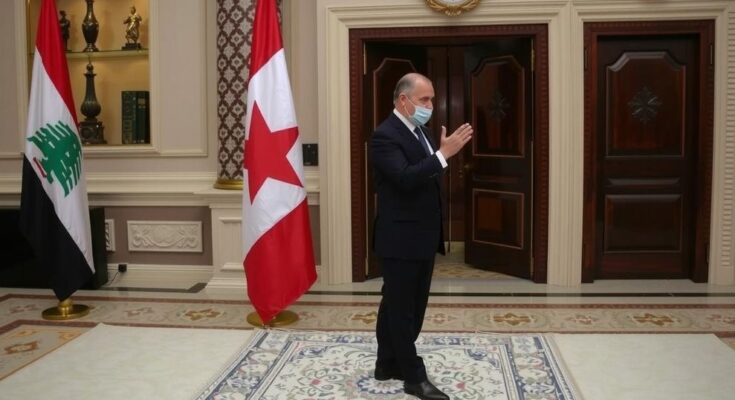The recent meeting between Lebanon’s Prime Minister Najib Mikati and Syria’s de facto leader Ahmed al-Sharaa in Damascus marks a historic visit aimed at addressing critical bilateral issues such as border security, smuggling, and the Syrian refugee crisis. This engagement indicates a potential strengthening of ties and a collaborative approach to shared challenges between the two nations.
In a significant diplomatic visit, Lebanon’s caretaker Prime Minister Najib Mikati met with Syria’s de facto leader, Ahmed al-Sharaa, in Damascus, the first such visit in 15 years. The two leaders discussed vital bilateral issues, including the urgent need to tackle smuggling and effectively delineate both land and sea borders. Mikati emphasized that Lebanon and Syria would collaborate closely to enhance border security and address mutual challenges. Moreover, discussions touched upon Syrian deposits in Lebanese banks, reflecting ongoing economic concerns between the two nations.
Al-Sharaa expressed optimism about establishing long-term strategic relations following Lebanon’s recent presidential election. “We and Lebanon have great shared interests,” he stated, highlighting the significance of continued dialogue. The agreement to form committees aimed at mitigating smuggling activities demonstrates a proactive approach to concerns over weapons and drugs flowing from Syria into Lebanon, particularly given Hezbollah’s historical support for al-Assad during Syria’s civil war.
Additionally, al-Sharaa indicated his country’s intention to address the issue of Syrian refugees in Lebanon, an ongoing burden that has strained the Lebanese economy. Estimates suggest that approximately 1.5 million Syrian refugees have sought asylum in Lebanon since the onset of the Syrian civil war in 2011. This conflict has resulted in substantial losses of life and widespread displacement. President Joseph Aoun of Lebanon remarked on the necessity of fostering serious discussions with Syria, which had exercised significant influence over Lebanon during the al-Assad regime’s tenure.
Historically, Syria maintained a military presence in Lebanon for 29 years, which ended in 2005 amid international pressure following the assassination of former Lebanese Prime Minister Rafik Hariri. The current visit marks a pivotal shift in relations, urging both nations to rebuild and stabilize their partnership for future prosperity.
The meeting between Prime Minister Najib Mikati and Syria’s de facto leader Ahmed al-Sharaa comes after a prolonged period of strained relations between Lebanon and Syria, primarily due to the civil war in Syria that began in 2011. Over the past decades, Syria’s influence in Lebanon has been characterized by military presence and political sway, significantly impacting Lebanese sovereignty. Recent developments, however, signal a potential thaw in relations, especially following the election of Lebanon’s new president, Joseph Aoun, who advocates for dialogue and collaboration with Syria. As both nations face economic challenges, addressing mutual concerns, such as border security and the refugee crisis, is increasingly viewed as essential for stability and cooperation.
The meeting between Lebanon’s Prime Minister Najib Mikati and Syria’s leader Ahmed al-Sharaa signifies a potential turning point in Lebanese-Syrian relations. By agreeing to collaborate on border security and tackle issues such as smuggling and the Syrian refugee crisis, both nations are taking steps toward a more stable and cooperative future. The historical ties and shared challenges beckon a renewed partnership that could enhance regional security and economic recovery for both Lebanon and Syria.
Original Source: www.aljazeera.com




